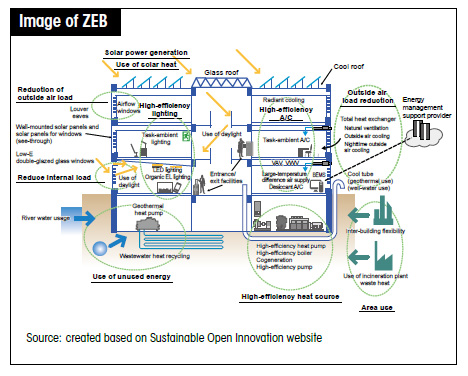ENVIRONMENT/ENERGY, DISASTER PREPAREDNESS AND AREA MANAGEMENT
Environment/Energy
- Environmental Policy Trends
Environmental issues, particularly those related to climate change, are a serious problem that affects the global community. In 2020 Japan declared its intention to become carbon neutral by 2050. With this, in 2021 the raising of the CO2 emissions reduction target for 2030 and orientation for energy composition were indicated in vital strategies such as the Energy Basic Plan and Global Warming Countermeasures Plan.
In the field of residences and buildings, ZEH and ZEB targets, etc. for 2030 and 2050 were indicated and debates on expanding the utilization of renewable energy are accelerating.
- Real Estate Industry Issues and Voluntary Action Plan Formulation
When it comes to the impact of the real estate industry on the environment, reducing energy consumption and reducing CO2 emissions at the same time have become pressing issues. Other important issues in the development and management of real estate include alleviating the heat island effect accompanying urbanization, reducing business-related waste emissions and final disposal amounts, and preserving biodiversity.
In March 2013, RECAJ formulated the Real Estate Industry Environment Implementation Plan, which sets forth medium- to long-term environmental action targets, and has been conducting yearly follow-up surveys targeting member companies. Also, in 2021, it formulated the Long-Term Vision for the Real Estate Industry for the Realization of a Decarbonized Society, which organized the means of contribution and orientation for the real estate industry to proactively work toward the realization of a decarbonized society looking to 2050, and also broadly revised the Real Estate Industry Environment Implementation Plan as a medium-term environmental action goal for 2030.
- Sustainable Urban Development
Cutting-edge initiatives toward sustainable urban development are taking off in the real estate industry. State-of-the-art buildings and housing such as Zero Energy Buildings (ZEBs), Zero Energy Houses (ZEHs)* and certified low-carbon houses* are coming on to the market.
Over the past few years, new concepts seeking a lower environmental load and sustainability in investment and development, like ESG investment (investment focused on companies considerate of the environment, society and corporate governance) and the Sustainable Development Goals (SDGs), have emerged.
With regards to systems for evaluating and certifying the environmental performance of housing and buildings, besides national systems such as the housing performance indication system or BELS, there are also systems run by private-sector organizations and the like, including CASBEE and LEED. Real estate companies are expected to not only actively use such systems but also pass on information to tenants and housing buyers.
Disaster Preparedness
- Improving Disaster Preparedness Capabilities of Cities (Hard and Soft Measures)
Efforts to improve the disaster preparedness capabilities and business continuity of major cities is extremely important in maintaining Japanese society and economic functions, and the real estate industry has worked to do this with its urban renewal and development. Responding to the risk of disasters such as earthquakes directly below Tokyo or in the Nankai Trough, which would cause immense damage, as well as typhoons and torrential rains which have become more frequent in recent years, is a pressing issue; therefore, the danger of heavily concentrated city areas must be eliminated as quickly as possible.
Tokyo’s disaster risk is also a weakness from the perspective of enhancing its international competitiveness. The public and private sectors must work together to enhance disaster preparedness functions, ensure business continuity as well as pursue urban development that is resilient enough to disasters that a certain level of economic activity can continue even if a disaster does occur, all so that overseas companies will feel secure in expanding to Japan.
To that end, by promoting quick, consistent urban renewal, the industry must work to develop high-spec buildings with BCP functions such as anti-inundation measures, vibration-controlling/seismically-isolated structures, and emergency power generation equipment, and the ability to serve as regional disaster shelters, taking in nearby stranded commuters. In conjunction with these hard aspects, efforts to enhance soft aspects such as forming a cooperative disaster-mitigating structure are no less essential.
Area Management
- What is Area Management?
Urban development until now has focused on hard aspects like infrastructure development, but a growing priority is “area management” focusing on private sector-led promotion of resident-company interaction, events to create community dynamism, and other “soft” aspects in defined areas. Many times, the private sector, which is key, acts in the form of area management organizations.
Examples include events using public roads and various other initiatives to enhance community energy, which can be expected to increase population inflow, stimulate commerce through customer attraction and solidify regional branding. These also make it easier for residents and employees to work together in times of disaster.
The Ministry of Land, Infrastructure, Transport and Tourism is supporting this trend in ways such as formulating an Area Management Promotion Manual in 2008. Also, in 2020, a support system for the “Comfortable City That Induces Walking” initiative was formulated that, together with the system for roads that enhance convenience for pedestrians (“hokomichi”) established the same year, is expected to facilitate the use of public spaces.
- Efforts to Secure Financial Resources
One issue when promoting area management activities is the securing of stable sources of funds. Relying on the involved companies, individuals and organizations to pay for it themselves casts doubt on activity continuity. It is especially necessary to solve the freeloader problem through which some people benefit from the area management activities without bearing the necessary costs. In order to address this problem, the Japanese government, using the example of cases of Business Improvement Districts (BIDs), which are used overseas, as a reference, introduced an Area Management Expense System* in the revised Regional Revitalization Act enacted in June 2018 through which real estate owners within a designated area provide funding, which is distributed to the area management groups and others. The Ministry of Land, Infrastructure, Transport and Tourism also formulated guidelines on frameworks to secure financial resources for private-sector urban development activities last August.


